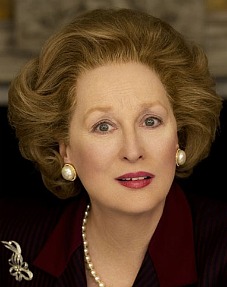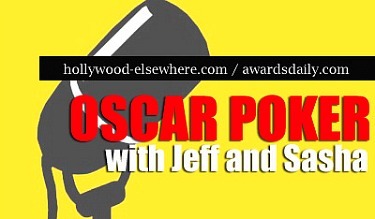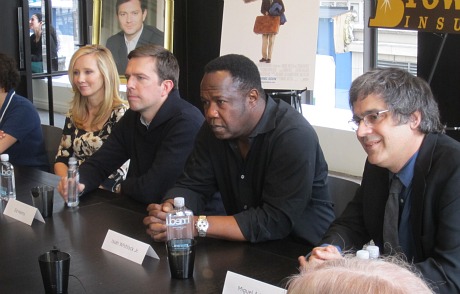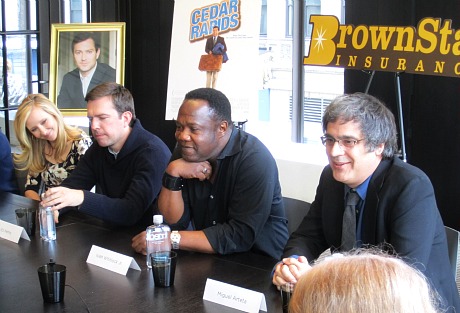Stick with the longish Brad Bird tribute, which showed at last weekend’s Annie Awards, until the 4:30 mark for a very funny bit. I should have snagged this when it first went up yesterday afternoon but I didn’t and so what?
It's Been Months
It’s important to remember what Submarine director-screenwriter Richard Ayoade told me prior to the Toronto Film Festival, which is that his romantic dramedy (costarring Craig Roberts, Noah Taylor, Sally Hawkins and Paddy Considine) is more of a Mike Nichols-meets-Wes Anderson thing than just an Anderson-y thing about quirky young love. The Nichols aspect alludes, I gather, to the anguish and heavy heartache thing that has turned up in various Nichols films, including The Graduate.
This is a way of saying that despite opportunities in Toronto and Sundance, I still haven’t seen Submarine. But I’ll get there.
Calling Dave Karger!
And Pete Hammond and Tom O’Neil and Sasha Stone and Kris Tapley all the other Oscar pulse-takers. Because the 2011 Best Actress race is all but settled as of this moment. Or at least, it has an obvious front-runner in the star of The Iron Lady. Look at her! And imagine her Margaret Thatcher accent….are you kidding? With Academy members being the suckers they are and always will be for lofty-realm British drama?


The only thing that can screw things up is if the film itself turns out badly, which is certainly possible given that Phyllida Lloyd (Mamma Mia) is directing.
There’s also a slight complication from the Streep’s post-Iron Lady role, a sure-to-be-knockout performance as the chain-smoking Violet Weston in John Wells‘ film version of August: Osage County, which the great Harvey Weinstein is distributing. If Streep takes the Best Actress Oscar for playing Margaret, it’ll be just a bit tougher for Harvey to land her an Oscar nomination as Violet because people might be feeling a wee bit Streeped out. So it would suit Harvey’s game if The Iron Lady turns out to be not so hot. Just sayin’.
Blame The Audience
Why? A good film is a good film no matter where you see it or with whom, right? No — some well-made, quality-level movies need a good audience. It’s a give-and-take, back-and-forth thing — the film feeds the audience and vice versa. Al I know is that the folks I saw it with last night (my son included) were so dead and unresponsive that they sucked the oxygen right out of the room and out of the film. That put me into a bad mood and I began to feel irritated. I turned around and glared at the audience a couple of times.
There’s a tiny little bit in the beginning when Ed Helms starts to give a faint attaboy hug to a star salesman in his Brownstar Insurance office. But the salesman, who wants as little to do with Helms as possible, ever so slightly flinches. The Sundance audience got it, chuckled. Last night’s audience sat there like crash-test dummies.
It’s the same dynamic that Broadway theatre critics have been writing about for decades. A dead audience can make a good comedy seem a lot less funny than it actually is in the eyes of God. Same deal with sharp comedians in a comedy clubs — if an audience is too thick or slow of pulse to respond to the material in the right way, they can kill any joke or punchline — they can reduce a comedian to tears.
All I know is that I could feel the deadness at the very beginning, and I knew it wasn’t the film’s fault. It was the damn people around me, and particularly Jett. He was checking messages on his iPhone three minutes into the film. I backhanded his leg and told him
to cut it out. Five minutes later he leaned over and whispered, “This isn’t funny.” But his reaction would have been different if he’d seen Cedar Rapids with me at the Eccles. I know it would have been.
Austin Destiny
I’ve never gone to South by Southwest because it always seemed too pain-in-the-assy in various ways. My far-off impression has always been that it’s a slightly hipper and more discriminating cousin of ComicCon, which is to say slightly more tolerable than that San Diego gathering but more fanboyish that I would normally find comfortable. But now that Summit’s release date for Jodie Foster and Mel Gibson‘s The Beaver has been bumped back to May 6th, I feel that I need to attend SXSW in order to catch it on March 16th in Austin.
Yes, I’ve decided to spend at least $600 or $700 bills that I could otherwise keep in my savings account so I can (a) see The Beaver a few weeks earlier and (b) see how it plays with the under-35 Austin beer-and-taco crowd.
Yes, I can also catch up with (a) the super-special Ain’t It Cool News 15th Anniversary screening of whatever, (b) Takashi Mike‘s 13 Assassins (which I couldn’t be bothered to see in Cannes last May because I despise fetishistic Asian chopsocky, (c) Rodman Flender‘s Conan O’Brien Can’t Stop, (d) Greg Mottola‘s Paul (which I’m probably going to hate), (e) Duncan Jones‘ Source Code (which is probably going to make me sigh and groan a lot), and (f) James Gunn‘s SUPER (which I’m probably going to hate). Plus it’ll probably be fun socially. And I can wear my cowboy hat again.
Firmware Solution
Nearly a month ago I mentioned an inability to play my Broadcast News Bluray because of a Bluray firmware update I need to install. Right after that I asked Sony to send me a firmware software disc, and they said they’d do so right away but it didn’t arrive until after I left for Sundance/Santa Barbara. So I installed it last night (easy, no big deal) and now I can watch my Broadcast News plus two other Blurays that wouldn’t play due to lack of proper firmware.

The downside is that right now it doesn’t feel as vital and exciting to savor Broadcast News as it did, say, three or four weeks ago. It’s an excellent film and I’m glad I own it, but the fresh-Bluray-coolness moment has passed. Now the cool Bluray to have and to watch is Sweet Smell of Success, which Criterion will street on 2.22.
Oscar Poker #20
Awards Daily‘s Sasha Stone, Boxoffice.com‘s Phil Contrino and I discussed the state of things this morning — the post-depression, no-more-bargaining, post-anger “acceptance” of the forthcoming Oscar wins by The King’s Speech (“a very good B-plus movie”), a little Cedar Rapids riffing, choosing the likely Oscar winners on a category-by-category basis, how The Social Network is a kind of comfort-blanket film, etc. The iTunes link is above; here’s a non-iTunes link.

Rapids in Manhattan
After recording Oscar Poker #20 this morning with Awards Daily‘s Sasha Stone and boxoffice.com’s Phil Contrino, I ran up to the Hotel Andaz (Fifth Avenue and 41st Street) for a Cedar Rapids press conference with star-producer Ed Helms, director Miguel Arteta, and costars Anne Heche and Isiah Whitlock, Jr.
I asked two questions: (1) Did Helms or Arteta or screenwriter Phil Johnston ever literally say to themselves “let’s try to go in a Billy Wilder and/or Preston Sturges direction here” (which I feel they absolutely did, given the proof on the screen) or are just guys like myself bringing up this analogy? And (2) are they in any way concerned that the Sundance stamp on the film’s one-sheet might persuade Eloi popcorn types that Cedar Rapids isn’t low and common enough in a Hangover sense — i.e., that it might be too hip for the room in an indie-movie sense?
In the view of some I spoke to during Sundance Cedar Rapids isn’t indie-dweebie enough — it’s a very mainstreamy-type comedy — but some people, I’m guessing, are spooked by the name “Sundance.”

41st Street exterior of the Andaz hotel.

Latino Breakfast
Yesterday morning at 8 am, fresh off the L train from JFK, I walked into El Brilliante cafe for some breakfast. The food is decent but they’re always playing Latin music — loud, throbby, bassy — at unacceptably loud levels. Who enjoys getting their ears pinned back by barrio music during breakfast? An eggs-and-bacon experience should never be accompanied by anything more than mild chit-chat, soft talk-radio and the rustle of newspapers.
Stuart's Sundance Final
Two weeks after the end of Sundance 2011, NYC-winter-blizzard short-film guy Jamie Stuart emerges with a definitive fragment montage.
And Now I Can See
According to a 2.14 New Yorker profile called “The Apostate,” director Paul Haggis got a surprise when he forwarded his August 2009 Scientology resignation letter to “more than twenty” Scientologist friends, including Anne Archer, John Travolta and Sky Dayton, the founder of EarthLink. “I felt if I sent it to my friends they’d be as horrified as I was, and they’d ask questions as well,” Haggis says. “That turned out to be largely not the case. They were horrified that I’d send a letter like that.”
Smith vs. Horowitz
We’re all got lively opinions about Kevin Smith these days, particularly over the last year between his anti-Southwest Airlines rant, his decision to go more or less anti-press in the wake of Cop Out, and last month’s Red State auction-that-wasn’t-an-auction at Sundance.
Smith really hasn’t subjected himself to a longish on-camera interview in quite some time, and that, I’m told, is what Horowitz will be doing with him tomorrow. We’re talking about an hour-long streaming interview on MTV.com from 3 to 4 pm. Horowitz is asking for questions to be tweeted to him with the hashtag #askkevin. (Meaning that anyone who wants to ask a question should tweet it with “#askkevin” in the message. That allows MTV staffers to find it more readily. Questions can be tweeted anytime — now, during the show, whenever.)


